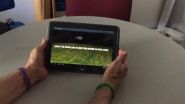(Press-News.org) People of all ages recently lined up to do some fishing at the Museum of Science in Boston. And oddly, the fish they hoped to hook were not good ones.
Museum goers were invited to play "Fish Police!!" is a video game that challenged players to rid a river of its bad fish, while sparing its good ones. The catch? All the fish looked exactly alike, and could be told apart only by the way a fish puffed in size: a bad fish puffed just a little faster. After all, it was nervous that it would be caught.
The game's premise may sound a little fishy, but it has helped a team of researchers, including Brandeis professorsRobert Sekuler and Timothy Hickey, graduate student Yile Sun, and research partners from Boston University investigate audiovisual interaction and the impact of sensory distraction.
The game, which quickly became popular, was played in the Museum's "Living Laboratory," a space dedicated to interactive public science.
"Many people wanted to play again, but we couldn't allow it because there was a line waiting," Sekuler said. "We were delighted to see that so many different people were hooked in a way that combined fun and challenge with an opportunity to contribute to science."
As each fish came into view and swam rapidly across the river it made a distinct humming sound, which the players had been warned to ignore. Despite the warning, players selected the correct answer more often and more quickly when a fish's humming and puffing were synchronized. Players floundered, though, when a fish's humming and puffing were out of synch.
Interestingly, players varied greatly in their susceptibility to the distracting sound. And surprisingly, the ability to ignore the fish's humming sound did not change with age. Sekuler said players as old as 82 and as young as 6 were about equally impacted by the distracting sound, which all had been warned to ignore.
The researchers knew that conducting the test in the "Living Laboratory" posed several challenges, including ensuring that it would appeal to museum visitors. Graduate student Yile Sun suggested the test be incorporated into a video game and took the lead in developing the game. Adding a big scoreboard that showed how players fared against each other seemed to lure even more to the game.
"Showing how they stacked up against others was a big motivator," Sekuler said.
The research was conducted collaboratively by Sekuler, Hickey and Sun of Brandeis, and Hannah Goldberg and Barbara Shinn-Cunningham of Boston University. The results were recently published in the online journal iPerception.
According to Sekuler, the researchers are now working to bring the game to the Internet so that many more people can play, and contribute data. The goal is to figure out why some people are particularly susceptible to the influence of the sound they were trying to ignore. Eventually, a version of the game could be used to as a training tool to help minimize the impact of irrelevant sounds on performance.
"It may even how people learn how to ignore, which is an important, but often overlooked component of attention," Sekuler said.
INFORMATION:
The study was supported by the Center of Excellence for Learning in Education, Science and Technology, a National Science Foundation Science of Learning Center.
Amsterdam, NL, August 25, 2015 - Patients with relapsing-remitting multiple sclerosis (RR-MS), the most common form of the disease, often have deficits in two neuropsychological functions, autobiographical memory (AM) and episodic future thinking (EFT), which impact quality of life. In a new study published in Restorative Neurology and Neuroscience, researchers report that training RR-MS patients in mental visual imagery (MVI) can improve AM/EFT functioning.
AM facilitates the ability to remember personal detailed events within a specific location and timeframe. EFT enables ...
Murderers who kill intimate partners and family members have a similar profile
One-third of all women murdered in U.S. are killed by male partners
Wives and family members wrongly think 'my husband or son would never hurt me'
CHICAGO --- Murderers who kill intimate partners and family members have a significantly different psychological and forensic profile from murderers who kill people they don't know, reports a new Northwestern Medicine study that examined the demographics, psychiatric history and neuropsychology of these individuals.
The new knowledge about ...
HOUSTON, August 25, 2015 - Pancreatic cancer is extremely deadly and often has a poor prognosis. Ranked as the fourth deadliest cancer in the U.S. and poised to move up within the next few years, pancreatic cancer is very difficult to detect in its early stages. Seldom diagnosed early and typically spreading rapidly, the disease has no effective treatment once it advances.
University of Houston researchers are on a mission to develop drugs that will allow physicians to prolong patient survival and, possibly, even eradicate this deadliest of cancers.
"Our research ...
Two studies in the August 25 issue of JAMA examine the effect of physical activity and nutrient supplementation on cognitive function.
In one study, Kaycee M. Sink, M.D., M.A.S., of the Wake Forest School of Medicine, Winston-Salem, N.C., and colleagues evaluated whether a 24-month physical activity program would result in better cognitive function, lower risk of mild cognitive impairment (MCI) or dementia, or both, compared with a health education program.
Epidemiological evidence suggests that physical activity is associated with lower rates of cognitive decline. ...
Among U.S. veterans who returned from Afghanistan and Iraq, being separated from the military for misconduct was associated with an increased risk of homelessness, according to a study in the August 25 issue of JAMA.
Adi V. Gundlapalli, M.D., Ph.D., M.S., of the VA Salt Lake City Health Care System, Salt Lake City, and colleagues analyzed Veterans Health Administration (VHA) data from U.S. active-duty military service members who were separated (end date of last deployment) from the military between October 2001 and December 2011, deployed in Afghanistan or Iraq, and ...
Among children with in-hospital cardiac arrest with an initial nonshockable heart rhythm who received epinephrine (adrenaline), delay in administration of epinephrine was associated with a decreased chance of 24-hour survival and survival to hospital discharge, according to a study in the August 25 issue of JAMA.
Approximately 16,000 children in the United States have a cardiac arrest each year, predominantly in a hospital setting. Epinephrine is recommended by both the American Heart Association and the European Resuscitation Council in pediatric cardiac arrest. Delay ...
In preliminary research, the detection of persistent leukemia-associated genetic mutations in at least 5 percent of bone marrow cells in day 30 remission samples among adult patients with acute myeloid leukemia was associated with an increased risk of relapse and reduced overall survival, according to a study in the August 25 issue of JAMA.
Approximately 20 percent of adult patients with acute myeloid leukemia (AML) fail to achieve remission with initial induction chemotherapy, and approximately 50 percent ultimately experience relapse after achieving complete remission. ...
For patients with an often-deadly form of leukemia, new research suggests that lingering cancer-related mutations - detected after initial treatment with chemotherapy - are associated with an increased risk of relapse and poor survival.
Using genetic profiling to study bone marrow samples from patients with acute myeloid leukemia (AML), researchers found that those whose cells still carried mutations 30 days after the initiation of chemotherapy were about three times more likely to relapse and die than patients whose bone marrow was cleared of these mutations.
The study, ...
Several Palaeozoic mass extinction events during the Ordovician and Silurian periods (ca. 485 to 420 to million years ago) shaped the evolution of life on our planet. Although some of these short-lived, periodic events were responsible for eradication of up to 85% of marine species, the exact kill-mechanism responsible for these crises remains poorly understood.
An international team led by Thijs Vandenbroucke (researcher at the French CNRS and invited professor at UGent) and Poul Emsbo (US Geological Survey) initiated a study to investigate a little known association ...
PITTSBURGH--The historic outbreak of Ebola virus disease in West Africa that began in March 2014 and has killed more than 11,000 people since, has raised new questions about the resilience of the virus and tested scientists' understanding of how to contain it. The latest discovery by a group of microbial risk-assessment and virology researchers suggests that the procedures for disposal of Ebola-contaminated liquid waste might underestimate the virus' ability to survive in wastewater.
Current epidemic response procedures from both the World Health Organization and the ...


